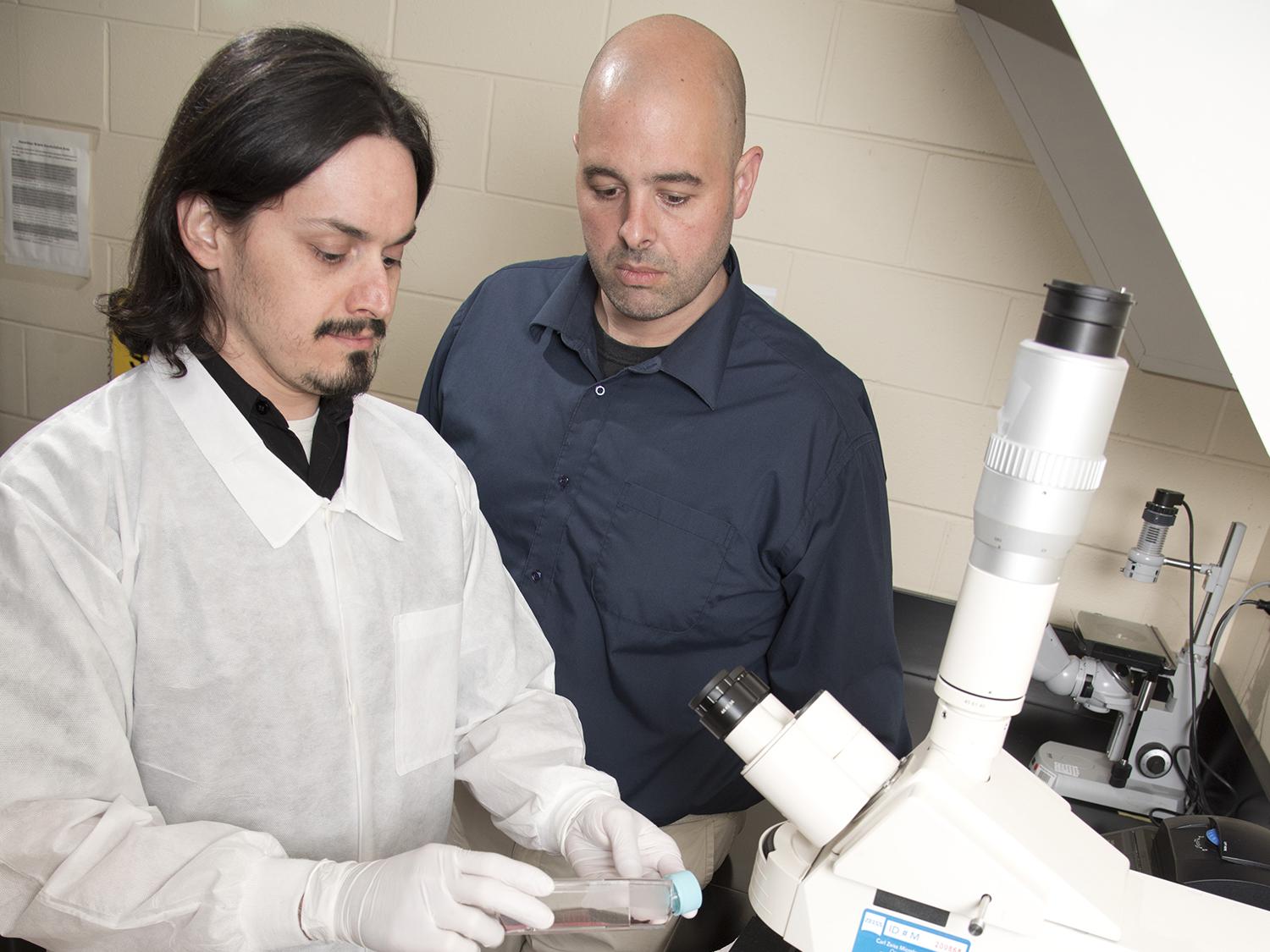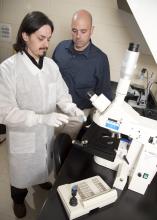Information Possibly Outdated
The information presented on this page was originally released on March 8, 2016. It may not be outdated, but please search our site for more current information. If you plan to quote or reference this information in a publication, please check with the Extension specialist or author before proceeding.
Veterinarians seek answers to canine, human cancers
STARKVILLE, Miss. -- Aspirin can knock out minor aches and pains, but what if it also could play a role in cancer prevention?
That is the question a group of veterinarians at Mississippi State University are trying to answer. Drs. Kari Lunsford and Camilo Bulla are two members of the team who have spent about five years trying to understand the link between blood platelets and the spread of certain types of cancer. Their research focuses on canine cancer patients at the MSU Animal Health Center.
“Doctors have prescribed low-dose aspirin for years as a blood thinner. The way it thins the blood is by stopping some of the actions of blood platelets,” said Lunsford, an associate professor of small animal internal medicine at the MSU College of Veterinary Medicine. “People who have been on this therapy for many years have a lower incidence of some types of cancers.
“And veterinarians know that certain cancers can’t metastasize in animals that don’t have platelets, so we believe that platelets in some way control the behavior of cancer cells,” Lunsford said.
By finding out how platelets alter cancer cells and help them metastasize, the researchers believe they can successfully intervene in the process to slow or even stop the progression of common cancers in dogs and humans through earlier diagnosis and treatment.
In several overlapping studies, they focus on breast cancer, lymphoma and bone cancer, which act similarly in dogs and humans, said Lunsford, who also is program coordinator for the college’s Translational Biomedical Research Center.
Earlier research suggested that specific proteins in blood platelets do affect metastatic behavior in cancer cells in the lab. Now, one MSU investigation seeks to identify and monitor these proteins in dogs with cancer.
“Lymphoma is a cancer that can be treated successfully in dogs, but after about one year it reoccurs,” Lunsford said. “By the time the animal’s lymph nodes are swollen, which is one of the first symptoms, billions of cancer cells have already formed. We are looking for ways to predict when metastasis will occur, so that we can make earlier diagnoses and begin treatment sooner.”
Through their research, the MSU team has made some exciting discoveries. One development improved the process that helps pinpoint proteins in blood platelets that could provide earlier detection of metastasis in cancers such as lymphoma.
To look for these proteins, scientists use blood samples from cancer patients or lab animals. Traditionally, samples had to be in large volumes because they went through a multistep washing process to isolate the platelets. During the washing process, many of the platelets were lost and other blood cells remained and contaminated the samples. This problem skewed the results, Lunsford said.
“We have pioneered a process that requires only a small volume of blood -- the same amount a person or animal would give during an office visit -- that is 99.99 percent pure after the washing process and yields a high number of platelets,” Lunsford said.
Dogs are excellent models for research on these types of cancers, not only because these cancers behave very similarly in humans, but because the disease can be studied at an accelerated rate.
“For example, the type of bone cancer we are studying is diagnosed most often in teenagers and senior adults,” Lunsford said. “It is diagnosed in the same populations in dogs. But because of their naturally shorter life spans, dogs are teenagers at 1 to 2 years old and seniors at 10 to 12 years old. Interestingly, cancers seem to progress at proportionately accelerated rates. Cancers that tend to recur in 10 to 20 years in people may recur in 1 to 2 years in dogs, even with the best treatments.”
Because cancer is one of the leading causes of death among dogs, researchers can study animals with naturally occurring disease, as opposed to using laboratory models, said Dr. Camilo Bulla, an associate professor in the Department of Pathobiology and Population Medicine. The canine participants are patients undergoing treatments to save or prolong their lives.
“We have a high caseload of veterinary cancer patients,” Bulla said. “With dogs, we can study the disease in a similar situation as it would be found in a human patient.
“This gives us the opportunity to look at the entire picture as compared to laboratory animals. The dog’s immune system has already tried to defeat the disease, and couldn’t -- just like in a human,” Bulla said.
Although no solid evidence exists to prove that environmental factors influence most cancers in dogs, many researchers believe the fact that dogs share humans’ environments is important when studying diseases.
“Dogs live in close proximity to us, and share our lifestyle,” Bulla said. “We don’t have the same epidemiological data on dogs that has been gathered for people, but dogs live in our houses and share our environment, including the food we eat, the air we breathe, and even the beds we sleep in. How these things are important exactly, we don’t know for sure. But we do believe this proximity makes dogs better models than laboratory models.”
In addition to helping detect cancers earlier, the group’s work could also help identify new drug therapies.
“These research projects could allow us to engineer a new drug or to revisit some existing drugs that could potentially be used in a new way,” Bulla said.
Contact: Karen Templeton, 662-325-1100




